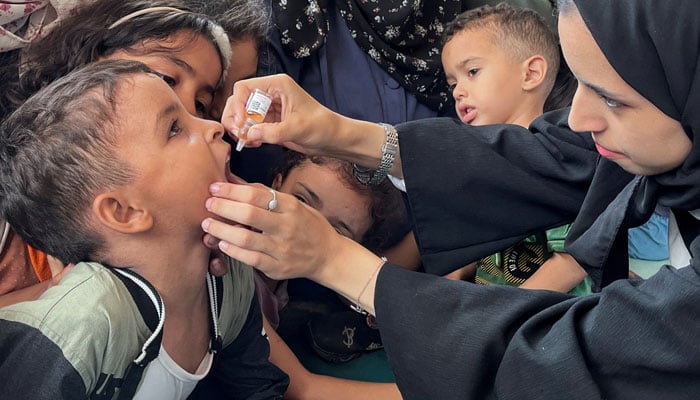Poliovirus tally in Pakistan reaches 40 with case reported in KP's Kohat
This is second poliovirus case from Khyber Pakhtunkhwa's Kohat district
October 24, 2024

- Second poliovirus case reported in district Kohat.
- Last two cases of disease were reported from Sindh.
- Balochistan reports most number of cases in Pakistan.
ISLAMABAD: Poliovirus continues to spread in Pakistan with the total number of cases now reaching 40 this year.
The latest case of the wild poliovirus type 1 (WPV1) was reported from Dara Adam Khel tehsil in District Kohat, Khyber Pakhtunkhwa, where a 30-month-old toddler was diagnosed with the disease, The News reported on Thursday citing the Regional Reference Laboratory for Polio Eradication at the National Institute of Health (NIH), Islamabad.
This is the second poliovirus case, confirmed by the lab on Wednesday October 23, from KP's Kohat district and raises alarm regarding the ongoing spread of the disease.
Genetic sequencing of the samples collected from the child is currently underway to further understand the spread and lineage of the virus.
So far in 2024, Pakistan has reported 40 polio cases, with Balochistan accounting for half of these. Sindh follows with 12 cases, Khyber Pakhtunkhwa with six and Punjab and Islamabad with one case each.
The surge in cases from Kohat is particularly concerning, as four environmental samples from the district have also tested positive for WPV1 this year.
The first polio case from Kohat was reported in September, suggesting continued presence and circulation of the virus in the area.
Th last two cases of polio were reported from Sindh, as per the National Emergency Operations Centre (EOC).
The emergence of new cases in Pakistan shows the extent of deterioration with regards to the poliovirus crisis in Pakistan.
The cases reported from Sindh were two young children — a boy from Mirpurkhas and a girl from Sanghar. Both were the first known instances of the disease in their respective areas this year.
According to the PEI officials in Islamabad, Sindh is experiencing an increase in virus transmission, particularly after multiple environmental samples from Mirpurkhas tested positive for WPV1 earlier this year. After Balochistan recorded 20 cases.
At least three children were also reported to have died due to the disease this year in Pakistan, according to National EOC sources. These victims belonged to Karachi and Balochistan.
The EOC sources said the child, Abdullah, who died of poliovirus hailed from Karachi’s Bin Qasim Town in the Malir district. While the other two children belonged to Balochistan’s Killa Saifullah and Quetta.
The government, on the other hand, is set to kick off a nationwide anti-polio vaccine campaign from October 28, said the EOC.
Misinformation and conspiracy theories continue to fuel vaccine hesitancy across Pakistan, especially in regions like Balochistan and KP.
Many parents refuse polio vaccines due to baseless myths, such as the false claim that vaccines cause infertility or are part of a foreign conspiracy. These unfounded fears, spread via social media and local communities, have led to widespread vaccine refusals.
The PEI officials urge parents to rely on scientific facts and consult healthcare professionals.
“Vaccines are safe and essential to protect children from paralysis. Listening to conspiracy theories is putting children at grave risk,” the official added.









